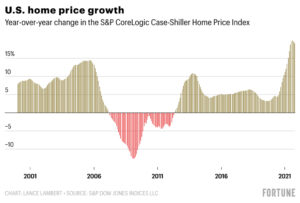There is growing concern among real estate professionals and economists that the Federal Reserve will raise interest rates this year as many as seven times. The first of these could come as early as March and could be a whopping one or two half points. St. Louis Federal Reserve President James Bullard is suggesting a full percentage point increase by July.
The purpose of the increases would be to curb inflation, which was at 7.5 percent in January, the highest it’s been in 40 years. The question on everyone’s mind is what will rising interest rates do to real estate?
3 Ways Rising Interest Rates Could Impact Real Estate in 2022
Real estate investors have enjoyed a healthy market for several years. Low housing supply and high demand for housing have driven up home prices, and historically low mortgage interest rates have meant that home buyers and investors have been able to acquire real estate capital at affordable prices. Could that change if the Fed does raise interest rates up to seven times in 2022?
The Motley Fool lists three ways rising interest rates could impact housing in 2022:
-
- Reduce buyer demand
- Slow down refinancing
- Decrease the rate of home price growth
In January, the average interest rate on a 30-year-fixed rate mortgage hit 3.22 percent. Since then, they’ve gone up to 3.92 percent. It’s likely they’ll go up even more if the Fed follows through with even one interest rate hike this year. Does that mean the real estate market will respond in a slowdown? It’s a bit more complicated than “higher interest rates equals lower demand” and downward pressure on pricing.
For starters, interest rates are not the only thing home buyers look for in deciding whether to buy or not. There are other factors. Nevertheless, we could see a margin decline in buyer demand.
Refinancing will likely be hit harder. It’s likely that we’ll see a spike in home refinancing in the next month or two and, as interest rates climb, refinancing will slow down. Homeowners, however, will try to lock in the lowest rate possible for a fixed-rate mortgage.
As far as home prices go, it is very likely that rising mortgage interest rates will put downward pressure on home prices. However, prices will likely continue to rise at least until equilibrium is reached between the inflation rate and interest rates if that is even a goal. Keep in mind that we’re operating on the heels of the fastest year-over-year home price increase in recorded history.

That period was from October 2020 to October 2021, which means price deceleration has already started.
There’s no doubt that an aggressive interest rate hike could have an impact on real estate, but let’s discuss realistic expectations. It’s Still the Best Real Estate Investing Environment in Decades
Even as mortgage rates begin to rise before the Fed’s expected interest rate policy for 2022, real estate investors are operating under the best market conditions for decades.
It’s Still the Best Real Estate Investing Environment in Decades
Housing Shortage
The housing inventory dropped 53 percent from April 2020 to April 2021, and that hasn’t improved. New listings were down 3 percent and active listings were down 26 percent during the week ending February 12, 2022, compared to the same period last year. What that means is that builders are still having a hard time keeping up with buyer demand. They just can’t build new homes fast enough.
Home Values Could Continue to Increase
While it might seem inevitable for rising interest rates to lead to lower home prices, interest rates are not the only factor that determines home values. When there is a low inventory of housing and high demand, that will drive home prices upward—and that’s precisely what we’ve seen in the last couple of years.
What makes 2022 different than 2021 is the expected interest rate increases. There is still a housing shortage and demand for housing, so far, has not let up. If the Fed’s interest rate increases do put a hamper on demand, it will likely not be a huge shift. Some potential homebuyers may get priced out of the market. However, those who can afford to buy a new home will continue to pursue that option. As a result, moderate demand and low housing shortage will still likely lead to home price increases, but the home values will likely not rise as fast as they did between 2020 and 2021. One forecaster predicts a 12 percent increase in home prices in 2022.
Demand for Housing Will Still Be High
Just as rising interest rates could lead to a slowdown in home prices, it could also hamper demand for houses, but not to a large degree. Some real estate experts are saying Spring 2022 could be a normal spring for home buyers. That’s not necessarily bad news.
Competition Among Investors Will Continue to Be Stiff
 If mortgage rates increase, driving up the cost of owning a new home, potential home buyers priced out of the market will be forced to rent. That will continue to create great opportunities for landlords and rental property owners. Multifamily real estate opportunities will increase. Single-family rentals will do well in low- and middle-income neighborhoods where some potential homebuyers can’t afford to buy but can afford to rent.
If mortgage rates increase, driving up the cost of owning a new home, potential home buyers priced out of the market will be forced to rent. That will continue to create great opportunities for landlords and rental property owners. Multifamily real estate opportunities will increase. Single-family rentals will do well in low- and middle-income neighborhoods where some potential homebuyers can’t afford to buy but can afford to rent.
This is not very different from the current real estate investing climate. However, competition for deal acquisition in a low-inventory environment will continue to present competitive challenges to real estate investors at all levels. Those with cash will have an advantage.
5 Reasons 2022 Will Still Be Good for Real Estate Investing
We can expect a slight cooling off in the real estate market in 2022, but it will still be a good year for real estate investors. Here are five reasons real estate investors can be optimistic even if the Fed does raise interest rates seven times this year.
- Rising mortgage rates will lead to an increase in renting – As noted above if potential homebuyers are priced out of the market due to the cost of owning a new home, they will become renters. That will increase opportunities in the single-family and multi-family rental markets.
- Low inventory means a competitive environment – The low housing inventory means house prices should continue to increase and make the real estate investing environment competitive.
- High housing demand – Even if demand diminishes, it will not kill the housing market. Worst-case scenario, it will be a normal year for home buyers. It will continue to be a seller’s market.
- House flippers can still profit – Rising interest rates may drive up the cost of owning a home in 2022, however, home values will continue to rise in much of the country. For house flippers, that means buying right could lead to more profits after the rehab work is done.
- Ground-up builders have the best opportunity – With continued low inventory, there is a lot of pent-up demand that ground-up builders can capitalize on.
Following a period with the lowest interest rates in a long time, a modest interest rate increase would not hurt the real estate market in 2022. It will do less damage than a prolonged period of high inflation.


